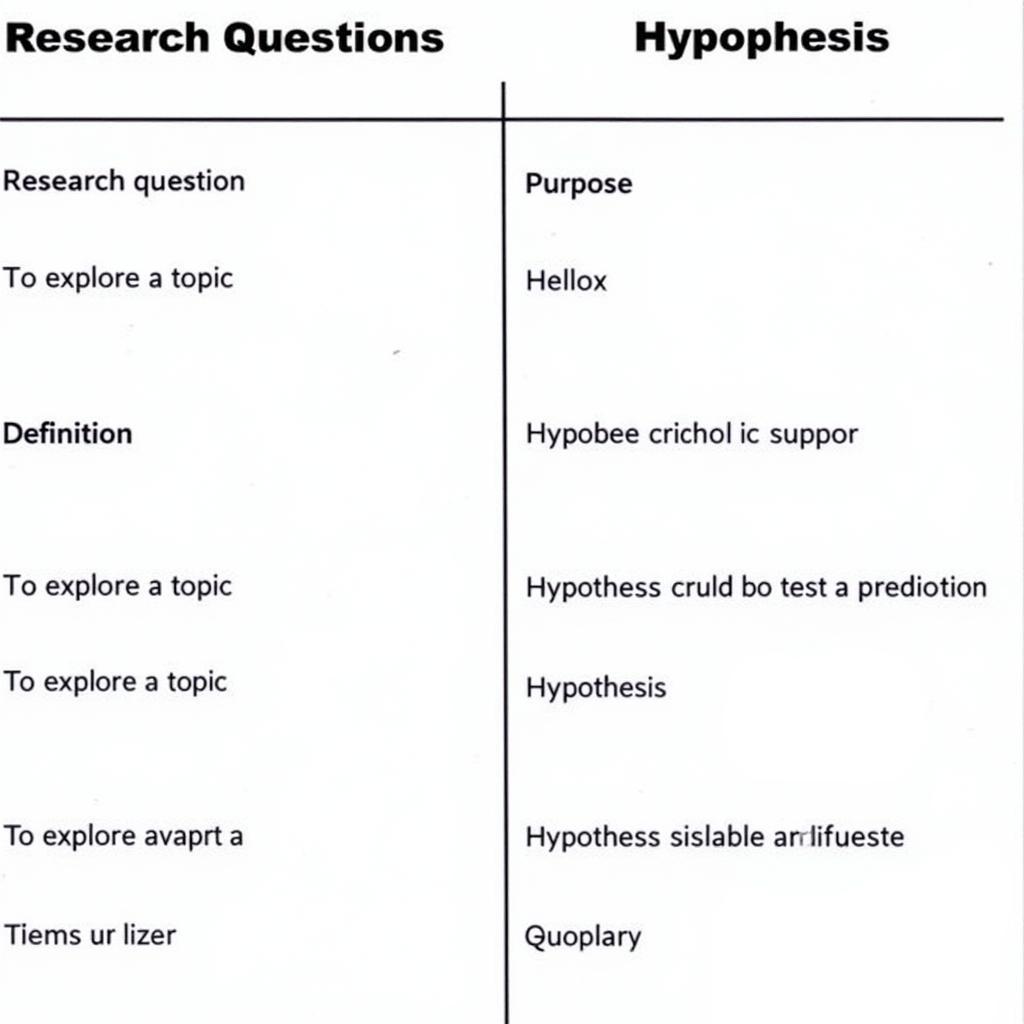A research question and a hypothesis are both crucial elements of the research process, but they serve distinct purposes. Understanding the difference between a research question and a hypothesis is essential for designing effective studies, whether you’re exploring the mysteries of the paranormal or investigating more mundane phenomena. what is difference between research question and hypothesis
Defining the Research Question
A research question is the fundamental inquiry that drives your research. It’s the question you’re trying to answer through your investigation. A well-crafted research question should be clear, focused, and researchable. It sets the stage for your entire project. Think of it as the compass guiding your exploration into the unknown. For example, in paranormal research, you might ask: “Do electromagnetic fields influence the occurrence of paranormal activity?”
Characteristics of a Strong Research Question
- Specific: Avoid broad, vague questions. Instead of asking “Does the paranormal exist?”, try something more specific like “Is there a correlation between reported ghost sightings and specific environmental factors?”
- Measurable: The research question must be answerable through observation or experimentation. You need a way to collect data related to your question.
- Achievable: The question should be realistic and feasible to answer within the constraints of your resources and time.
- Relevant: The question should contribute to the existing body of knowledge and be of interest to others in the field.
- Time-bound: While not always applicable, a time frame can help focus the research, especially in longitudinal studies.
Formulating a Hypothesis
A hypothesis, on the other hand, is a testable prediction about the relationship between two or more variables. It’s a statement that proposes a possible explanation for a phenomenon. It’s not a question, but rather a tentative answer to your research question. For example, a hypothesis related to the research question above could be: “Higher levels of electromagnetic fields are associated with increased reports of paranormal activity.”
Types of Hypotheses
- Null Hypothesis: This statement proposes that there is no relationship between the variables. For example, “There is no correlation between EMF readings and reported paranormal experiences.”
- Alternative Hypothesis: This statement proposes a specific relationship between the variables. This can be directional (e.g., “Increased EMF readings lead to increased reports of paranormal experiences”) or non-directional (e.g., “There is a relationship between EMF readings and reports of paranormal experiences”).
difference between research question and hypothesis
What’s the Difference? In Short
A research question asks a question, while a hypothesis proposes an answer. The research question guides the overall direction of the study, while the hypothesis provides a specific testable prediction within that study.
 Comparison Chart of Research Question and Hypothesis
Comparison Chart of Research Question and Hypothesis
Applying Research Questions and Hypotheses in Paranormal Research
what is the difference between hypothesis and research question
Investigating paranormal claims often involves formulating specific research questions and hypotheses. For example, if you’re investigating a haunted location, your research question might be: “What is the cause of the reported paranormal activity in this building?” Your hypotheses might include: “Residual energy from past traumatic events is causing the phenomena,” or “Electromagnetic anomalies are misidentified as paranormal activity.” By formulating testable hypotheses, you can design experiments to gather evidence and analyze the results.
“In any rigorous investigation, understanding the distinction between the question you are asking and the potential answers you are testing is paramount,” says Dr. Evelyn Reed, a leading researcher in parapsychology. “A well-defined research question leads to strong, testable hypotheses, which are the backbone of scientific inquiry.”
Conclusion
The difference between a research question and a hypothesis is fundamental to the research process. difference between a research question and a hypothesis Understanding how to formulate both will significantly strengthen your investigative abilities, whether you’re exploring the mysteries of the universe or the enigmas of the paranormal. By asking the right questions and proposing testable explanations, we can move closer to unraveling the secrets that surround us.
FAQ
- Can a research question be turned into a hypothesis?
- What are some examples of research questions in paranormal studies?
- What is the importance of a null hypothesis?
- Can a study have multiple hypotheses?
- How do I choose the right research question?
- How do I know if my hypothesis is testable?
- What if my research doesn’t support my hypothesis?
Common Scenarios Involving Research Questions and Hypotheses
- Investigating a haunted location: Research question: “Is there evidence of paranormal activity at this site?” Hypothesis: “EVP recordings will reveal anomalous sounds not attributable to natural causes.”
- Examining psychic abilities: Research question: “Can individuals accurately perceive information through extrasensory perception?” Hypothesis: “Participants in a controlled experiment will score above chance levels when predicting the outcome of random events.”
Further Exploration
For more information on research methodologies, see our article on research terms defined.
Contact Us
For assistance with your Paranormal Research, please contact us: Phone: 0904826292, Email: [email protected] or visit us at No. 31, Alley 142/7, P. Phú Viên, Bồ Đề, Long Biên, Hà Nội, Việt Nam. We have a 24/7 customer support team.